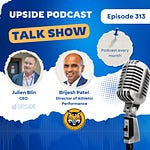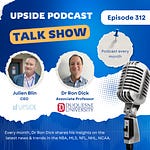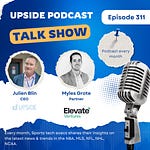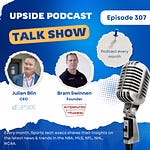This week we had the honor to interview a group of sports performance experts.
Marco Nunez, former head athletic trainer for the LA Lakers (NBA).
Karam Al-Hamdani, Head Athletic Therapist at CF Montreal (MLS).
Alexi Pianosi, Strength and conditioning coach for the Pittsburgh Penguins (NHL).
📝Show Notes: Through this interview, we touched on the Djokovic saga and whether or not athletes should be vaccinated to play. And then we discussed the Chelsea FC sale, the impact of dehydration and biofeedback on athletes’ performance.
🚀Best Quotes: Here are some of the key discussion points and best quotes from our conversation with Marco, Karam and Alexi.
On the controversy with Novak Djokovic and whether or not players should be vaccinated:
Karam Al-Hamdani:
“In terms of professional sport, my opinion is that athletes should get vaccinated because it's about protecting themselves and their fellow athletes. And for the lack of a better word, it's just about protecting everybody, so that we can enjoy playing the game at a top level without having to deal with other controversies here and there, like the Djokovic one, or like the Kyrie Irving one, but all while respecting people's opinions and whether they want to do it or not. It's a very controversial topic”.
Marco Nunez:
“So if a country says, "You have to be vaccinated," well, that's your choice if you choose not to be vaccinated and say, "Hey, you know what? I'm not going to get to play this tournament. It is what it is. I'll wait for next year”.
Alexi Pianosi:
“I think you have to remember that a lot of these entities, whether it's an NHL team, an MLS team, an NBA team, it is a private business. The players always have the choice not to play, not to show up to the pitch or to the game, or to the court or the ice. Now they always have the freedom to make that choice. And they're not being forced to do anything, but within a private business, if those are the rules put in place, like Marco said, then I think you need to abide by them (..) I think it's important to remember too that right now where we are, from a knowledge perspective, significantly different than where we were in March of 2020. We know a lot more about”.
On the Chelsea FC sale:
Karam Al-Hamdani:
“I have worked with Didier Drogba, a former Chelsea Legend, who played for CF Montreal, and we were actually pretty tight, him and I. I don't know how it was with the Lakers, Marco, but the players gravitate to one guy and they're usually like, "Okay, you're my guy and I'm just like “No one else touches me. It's only you." So that was how it was with him. And that's where I really developed a true fondness to the Chelsea Football Club, watching a whole bunch of highlights while treating him because he'd be like, "Oh, look, I scored this goal there, and this is what happened leading up to the goal. This is why I celebrated the way I celebrated”.
“The sale of Chelsea has huge implications. It's not just about the sport. The endorsements, the deals that may fall through because of the sale. What we fail to realize when we're outsiders is that it's a one giant ecosystem. And part of that ecosystem is the owner who helps fund it, so to speak. And when you have different ownerships who come in, it throws the ecosystem into turmoil, so to speak. But a little word on Russia and Ukraine, my heart goes out to all the Ukrainians. It's a very difficult situation that they're going through. And I say no to violence, a strong no to violence.
“Being of Iraqi descent myself, I've been through the war and having to leave my country and moving to a different place. So my heart really goes out to them and to everything that these people are dealing with”.
Alexi Pianosi: :
“So some of these athletes who might be playing in North America, whether it's the NHL or the NBA or MLS, whatever it might be, they might not have even been back to Russia for several years or decades since they came over. But they may have family or friends back in Russia who they're also worried about their safety as well. So it's a difficult situation. (..) And in my role, I get a chance to talk to some players like that and just try to be as supportive as I can and as empathetic as I can, because I can't put myself in their shoes. I've never been there, but I can only imagine how difficult it must be for them”.
On the impact of dehydration on athlete performance:
Marco Nunez:
“ I think consumption of water is one of the most underrated issues as far as pre activity, and then more importantly, post activity as far as the recovery process. Obviously, everybody drinks some water before. They consume some of their electrolytes and hydration drinks during activities, but they tend to neglect this as far as post activity as part of the recovery process. Everybody is really concerned about getting their proteins or carbohydrates, everything afterwards to be able to replenish the muscles, but they tend to forget about the hydration portion of it”.
“We had a player with the LA Lakers. Every time we traveled, on the dot we would land at a city, we'd leave a city, and go to the next city. We would land at about one o'clock, or two o'clock in the morning. He would shoot me a text or give me a call. "Hey Marco, I have a migraine. I have a headache." And it was just like that every single time for a couple of weeks (..) Gatorade helped us create a customized hydration program for all our athletes. And the hydration process began as early as 8:30 in the morning when they arrived (..) And then to say the least, after we did that, this athlete never called me ever again for a migraine or headache. Maybe once or twice, but it was for a different form of dehydration”.
Alexi Pianosi:
“Regarding hydration, we've also used the Gatorade Sports Science Institute before, Dr. Spree up from Guelph, Ontario. He is a great guy, a great practitioner, and he has done some really good research around it. We usually do sweat testing once a year, just on our players. Granted, if we have a little bit more roster turnover, we might need to do a little bit more testing than that, but just to get a baseline, I think it's pretty easy to tell who the big sweaters are and who aren't big sweaters. I find it is very individualized, especially at least in hockey based on the positions. I know that for us, the biggest dehydration risks or the biggest drops in body weight during a game is by far with goal tenders”.
“One of the most extreme examples that I can think of, we had a goal tender who was probably drinking six to seven liters of fluid and losing, by our estimation, about six grams of sodium. We were supplementing with six grams of sodium per game, which is I think a pretty high amount. So that's definitely a bit of an outlier that's an extreme example. But if you go back far enough, I think it was the 2003 Stanley Cup Finals. There was a goal tender who's now retired, Jean-Sébastien Dea, who was playing for Anaheim at the time. He was a Conn Smyth, one of only two or three players to be the Conn Smyth playoff MVP on the losing team. But he was amazing. And they were saying that he was losing close to 20 pounds per games”.
Karam Al-Hamdani:
“Coming back to our sport, there are some differences between our sport and for example, hockey and basketball, where in hockey there's shift work. In basketball, there are timeouts that are called. With us it's 45 minutes and it's you go, go, go, 15 minute break, and then we have another 45 minutes. So it becomes very difficult for us to flag our athletes and say, "Okay, you're starting to get dehydrated. Come to the sideline. Let me give you some water." So it becomes a strategy where you got to have them hydrate the day before and the day of the match”.
“Most recently, FIFA instilled rules where depending on the heat or humidity levels outside, they will instill a hydration break. And those hydration breaks happen at the 30th and the 75th minute of the game. You basically get three minutes and it's all hands on deck, medical staff, and performance staff giving hydration to the players, cold towels to try to bring the heat down. But other than that, the number one strategy that we adopt is that we know that at the beginning of the season, we will be playing against teams in hotter temperatures like in Orlando or Miami Florida. So we literally go to Florida to do our training camp. That way the players get acclimatized to playing in heat for prolonged periods of time”.
On the impact of biofeedback in elite sports.
Alexi Pianosi:
“I think biofeedback is a really interesting field. What AC Milan was doing there, I hadn't heard of before. It's funny. My first impression was not even on the science or on the biofeedback itself, but I was like, "Oh man, you're making these guys do another thing. They have to go in the mind room or they can't play?" (..) But the area that I think biofeedback, at least for me, shows the most promise, is on some of the recovery elements. I know Hyperice has a new device, The Core that uses some vibration to let you know when your breathing or your heart rate is starting to escalate a little bit, and things like the Muse S headband”.
“I think teaching players how to relax and how to calm down and use their breath to their advantage or the power of breathing, as Dr. Zaichkowsky might say. I think it's an incredible advantage that is not really utilized right now. It's easier to get people to work hard and connect the dots between that and their performance. But to connect the dots between just deep breathing and sitting in a quiet room and calming down for five or 10 minutes, I think at least in my experience, players have a harder time connecting that to the benefits of their performance. It's hard to feel when your parasympathetic tone increases or your sympathetic tone decreases, but I think we know pretty well that can be advantageous post game and in a recovery session. So any device that can aid in that process I think is going to be very useful”.
Marco Nunez:
“As far as the recovery process utilizing biofeedback and let that try to get your HRV level pretty low, I agree with Alexi, sometimes they don't seem to understand that. But when I bring up the issue, "Hey, as soon as we get your heart rate, your HRV level down to what it should be, that's when your recovery process begins", and they start connecting the dots on that part. The other area of feedback that I like to use a lot is in the rehabilitation process”.
“But the one thing when it comes down to what I notice with athletes, and like Alexi mentioned, oftentimes it's very difficult to get them to understand. But once you do get them to understand and you educate them on how it's going to help their performance, whether it's pre activity, post activity for recovery, I've noticed that they tend to be a little more receptive to it”.
Karam Al-Hamdani:
“We've used it historically in recovery from concussion. So would use computer programs and have the individual who's coming back from a concussion follow certain dots, by using eye tracking. That seems to help with the athlete, because once again, concussion revolves around the brain. And it's the one muscle that we can't really quantify in terms of hands on experience on how it's evolving. So that's really a good tool that we've used in the past and present”.
“From another perspective, we've also tried to educate the players. I don't know how it is in the basketball or in hockey, but a lot of our players play FIFA. They love to play FIFA. So our coaches try to emulate what's happening on the field and then try to have it connect to what they're doing when that they're playing the game. So it's like, "Okay, well, your position is this. You might want to be doing this or that." And then they try to do it while they're playing against each other. So we try to gamify things. We also try to make it fun, so that it doesn't always be a mundane, boring task”.
You may also like:
🔥Upside: AMS Ecosystem Analysis: Key Trends, Vendors and Recommendations to Teams
🔥 Upside Chat: Marco Nunez, Former Head Athletic Trainer (LA Lakers/NBA)
⭐Sports Performance Roles & Best Practices (Head of Performance, Head Athletic Trainer..)
🔥 Upside Chat: Ismael Fernandez, ThermoHuman CEO
🥽 🎮🏀 Major Sports Leagues Going Virtual to Offset COVID-19 Crisis
Don’t forget to check out our website at www.upsideglobal.co and email us at julien@sportscouncilsv.com if you need help reaching out to teams, or with your fund raising.











